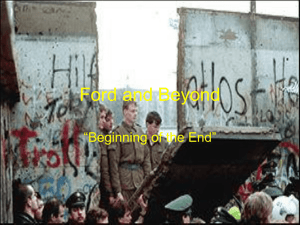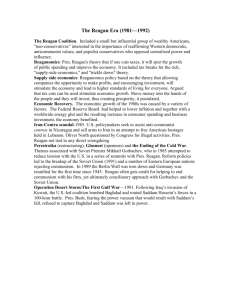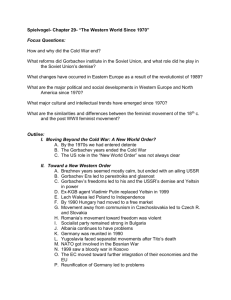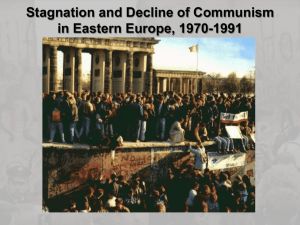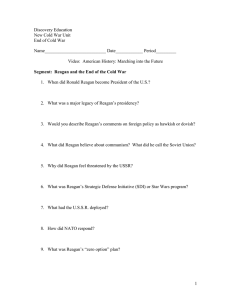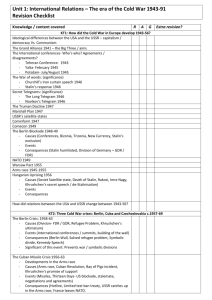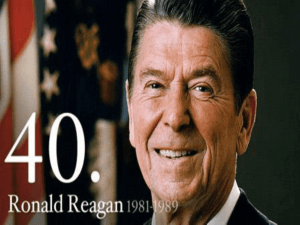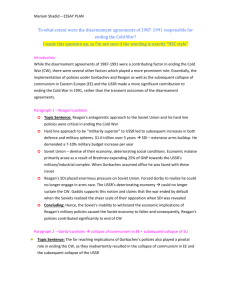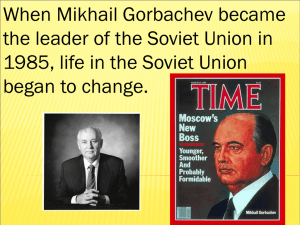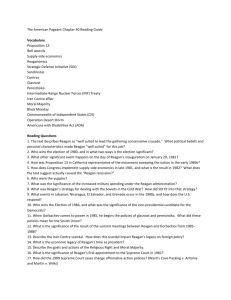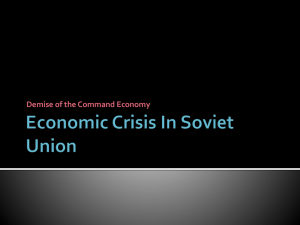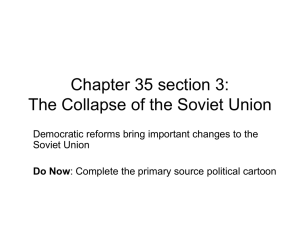Historiography of the Cold War - Beechen Cliff School Humanities
advertisement
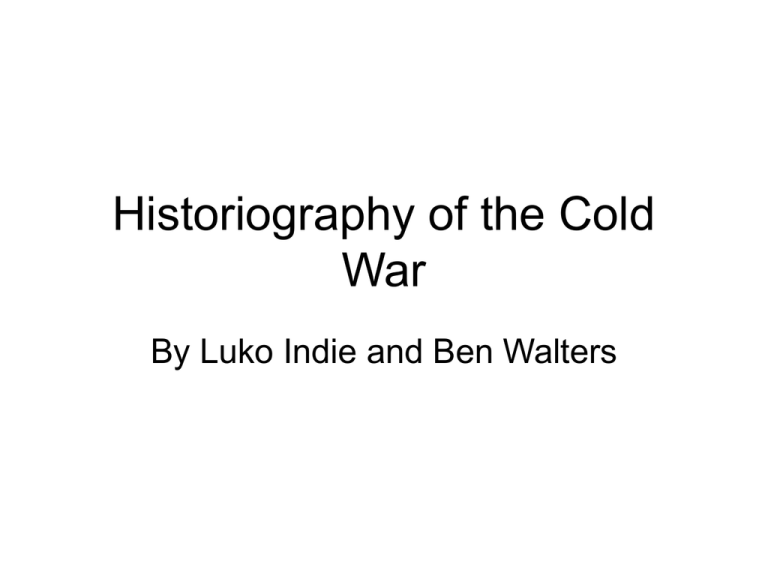
Historiography of the Cold War By Luko Indie and Ben Walters • There are several schools of thought on the importance of all the relative factors involved in bringing about the end of the cold war. These factors can be categorised into two groups; external factors such as the role of individuals and US foreign policy. The different schools of thought have opposing interpretations on these factors and tend to follow triumphalists views or critics of the triumphalists and the Russian historians. The internal factors look at the change of attitudes and ideology, and economic aspects of USSR domestic policies. • • • Triumphalists interpretations of events have brought attention to role of Ronald Reagan and his foreign policies directed at the USSR. Right wing views like J.L.Gaddis, William Clark and Richard Allen credit the hard-line approach adding pressure to an already unstable soviet economy, with the prospect of being unable to keep up with the military spending and weapons advancement of the US like SDI, the soviets had no choice but to end to arms race and the cold war. Historians like Peter Schweitzer who based his research on other writers that served in Reagan’s administration argue that the change from Détente to more aggressive policy was the determining factor in ending the cold war. The aggressive stance of Reagan and Thatcher is highlighted as the only effective way to stand up to aggression from the soviets, this is reinforced by the events of the late 20th century and early 21st century that show that producing the US victory in the Cold War is justification for the actions undertaken through Reagan’s foreign policy. The triumphalists view of Gorbachev is highly critical of his actions, emphasising that his policies were intended to strengthen the USSR in the hope of continuing communism and maintaining its position as an influential world power, thus he is difficult to trust because of his aims. • However critics of the triumphalists such as George Shultz argue that the hard line approach of the US government did little to win the cold war. Previous hard line policies like the one used during the Vietnam War proved ineffective and so there was no guarantee Reagan’s attempts would change soviet policy. • Raymond Garthoff among other historians also praise Gorbachev in having a greater role in ending the Cold War, they say he’s willingness to work with the West was the key factor that lead to cooperation of the superpowers. To many historians Gorbachev is a hero; supporting his New Political Thinking and the concessions he made/willing to make eased tensions with the US. • Russian historians and commentators are also divided when assessing the role of Gorbachev. Veterans and former KBG personnel claim that the pressure exerted by the US and the CIA through subversive means forced Gorbachev to ‘surrender’ to the West. Sergei Akhromeyev and Georgi Kornienko express the view that the aim of the US was to destroy the USSR and then weaken Russia as a country. However Gorbachev himself and members of his administration have defended their policies and see the collapse of the USSR and the end of the Cold War as two separate events. Although the studies came from the individuals very close to the matter their compelling use of evidence provides a strong counter argument. • Pope John Paul II has been highlighted by Jonathan Kwitney as being very influential, his speeches gave encouragement to the solidarity movement in Poland due to the predominantly Catholic population and spoke out against human rights violation within the soviet bloc. However the extent of the influence can be overestimated. While Catholicism was strong in Poland, elsewhere in Eastern Europe there were differing beliefs in lace and a good deal of the opposition to soviet rule were not affiliated to any religion. • • Internal factors have been cited as having a significant role in ending the Cold War. Domestic changes within the soviet system have been highlighted by the Ideational School. Instead of the view expressed by the truimphalists about Reagan’s pressure through policy and SDI, this school of thought shows that to Politburo was not concerned with the threat of SDI dismissing it as ‘science fiction’ nor were they willing to continue with the arms race, with scare mention of it in records. Instead the soviets were focused on preserving resources and revitalising their failing economy, with Reagan’s policies adding little additional pressure (M. Bowker). Critics of communism say the collapse of the USSR was due to the weakness of ideology of communism. The inefficient system of a state run economy and its inability to provide for its people made it a failing system, thus the collapse was an inevitable outcome. The development of popular protest movements or ‘people power’ in Eastern Europe is an indicator and consequence of the failure of communism as a regime, if not communism as an ideology. However the movement were only possible due to changes of the soviet system brought on by Gorbachev such as the encouragement of new ideas and the refusal to support unpopular communist governments around the world (abandoning the Brezhnev Doctrine). Gorbachev’s actions resulted in a spiralling chain of events that led to end the Cold War. • The release of new documents and records has allowed revision of previous views on the end of the Cold War. The national experiences and ideology on policy making emphasize the role of a change of attitudes held on the soviet people and its leadership. The Russian Historian Vladislav Zubok draws attention to these changing attitudes, saying with the fading away of traumatic memories from World War II changed the way the USSR viewed the West. The generational shift was reflected by the new elite and the new communist system. There was no longer a need to spread communist ideology or a need to have Eastern Europe as a buffer zone against Nazism. Gorbachev’s New Political Thinking and consequent domestic polices had such an impact because they were exacerbated by the social change taking place at the time.
